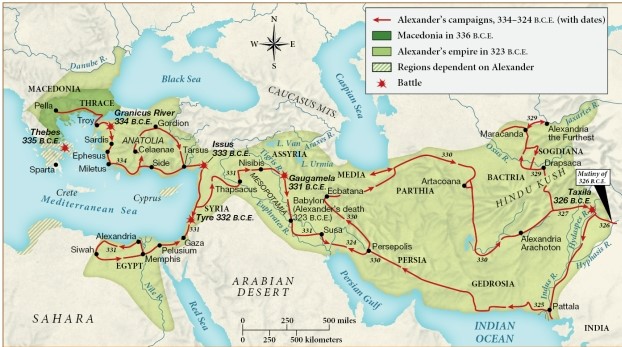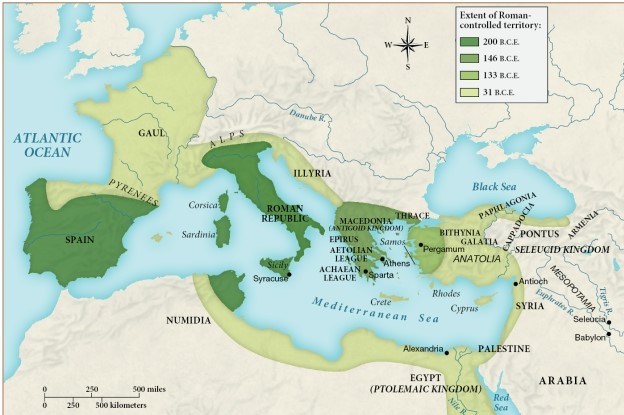Exam 4: From the Classical to the Hellenistic World, 400-30 B.C.E
Exam 1: Early Western Civilization, 400,000-1000 B.C.E65 Questions
Exam 2: Near East Empires and the Reemergence of Civilization in Greece, 1000-500 B.C.E64 Questions
Exam 3: The Greek Golden Age, C 500-C 400 B.C.E65 Questions
Exam 4: From the Classical to the Hellenistic World, 400-30 B.C.E65 Questions
Exam 5: The Rise of Rome and Its Republic, 753-44 B.C.E64 Questions
Exam 6: The Creation of the Roman Empire, 44 B.C.E-284 C.E65 Questions
Exam 7: The Transformation of the Roman Empire, 284-600 C.E64 Questions
Exam 8: The Heirs of Rome: Islam, Byzantium, and Europe, 600-75065 Questions
Exam 9: From Centralization to Fragmentation, 750-105065 Questions
Exam 10: Commercial Quickening and Religious Reform, 1050-115065 Questions
Exam 11: The Flowering of the Middle Ages, 1150-121565 Questions
Exam 12: The Medieval Synthesis and Its Cracks, 1215-134065 Questions
Exam 13: Crisis and Renaissance, 1340-149265 Questions
Exam 14: Global Encounters and the Shock of the Reformation, 1492-156065 Questions
Exam 15: Wars of Religion and the Clash of Worldviews, 1560-164865 Questions
Exam 16: Absolutism, Constitutionalism, and the Search for Order, 1640-170065 Questions
Exam 17: The Atlantic System and Its Consequences, 1700-175065 Questions
Exam 18: The Promise of Enlightenment, 1750-178965 Questions
Exam 19: The Cataclysm of Revolution, 1789-179965 Questions
Exam 20: Napoleon and the Revolutionary Legacy, 1800-183065 Questions
Exam 21: Industrialization and Social Ferment, 1830-185064 Questions
Exam 22: Politics and Culture of the Nation-State, 1850-187065 Questions
Exam 23: Empire, Industry, and Everyday Life, 1870-189065 Questions
Exam 24: Modernity and the Road to War, 1890-191465 Questions
Exam 25: World War I and Its Aftermath, 1914-192965 Questions
Exam 26: The Great Depression and World War II, 1929-194565 Questions
Exam 27: The Cold War and the Remaking of Europe, 1945-1960s64 Questions
Exam 28: Postindustrial Society and the End of the Cold War Order, 1960s-198965 Questions
Exam 29: A New Globalism, 1989 to the Present65 Questions
Select questions type
How did Alexander's military conquests further the spread of science back home in Greece?
Free
(Multiple Choice)
4.8/5  (38)
(38)
Correct Answer:
B
Which of the following statements can be justified by the map below?

Free
(Multiple Choice)
4.7/5  (37)
(37)
Correct Answer:
C
What Hellenistic philosophy argued that, although fate controls people's lives, one should nonetheless cultivate excellence, good sense, justice, courage, and temperance?
Free
(Multiple Choice)
4.7/5  (32)
(32)
Correct Answer:
C
Hellenistic sculpture differed from sculpture of the classical era in that it was more likely to
(Multiple Choice)
4.9/5  (32)
(32)
What did the successor kings rely on in order to maintain their kingdoms?
(Multiple Choice)
4.7/5  (35)
(35)
The art and literature of the Hellenistic Age (323-30 B.C.E.) reveals which of the following?
(Multiple Choice)
4.7/5  (34)
(34)
Where was the Hellenistic world's most impressive court, in terms of scholarship, learning, and library resources?
(Multiple Choice)
4.8/5  (30)
(30)
Compare and contrast the ideas of Plato and Aristotle; describe how their ideas were responses to the political and social conditions of the time.
(Essay)
4.8/5  (37)
(37)
What basic tenet did Plato hold fast to throughout his long career?
(Multiple Choice)
4.8/5  (36)
(36)
Although Aristarchus had proposed a heliocentric model of the solar system as early as the third century B.C.E., later astronomers rejected his model because
(Multiple Choice)
4.7/5  (37)
(37)
Why did the Epicureans believe that people should not fear death?
(Multiple Choice)
4.8/5  (26)
(26)
Upon his death, Alexander reputedly left his vast kingdom to
(Multiple Choice)
4.8/5  (47)
(47)
What factors allowed Hellenistic kingdoms to rule over such diverse populations for several centuries?
(Essay)
4.9/5  (44)
(44)
What is the overall significance of King Philip II's victory at the battle of Chaeronea in 338 B.C.E.?
(Multiple Choice)
4.8/5  (29)
(29)
Aristotle is renowned as the first scientist to attempt to collect and classify all available information on which of the following?
(Multiple Choice)
4.9/5  (36)
(36)
Which of the following territories did Rome control by 133 B.C.E.?

(Multiple Choice)
4.9/5  (39)
(39)
What caused the collapse of the Ptolemaic kingdom in the 30s B.C.E.?
(Multiple Choice)
4.8/5  (32)
(32)
Why did most urban elites cooperate willingly with Hellenistic monarchs?
(Essay)
4.7/5  (40)
(40)
What simplified version of Greek became the common language for international commerce and cultural exchange in the Hellenistic world?
(Multiple Choice)
4.8/5  (37)
(37)
In the ideal society described by Plato in The Republic, women
(Multiple Choice)
4.8/5  (38)
(38)
Showing 1 - 20 of 65
Filters
- Essay(0)
- Multiple Choice(0)
- Short Answer(0)
- True False(0)
- Matching(0)